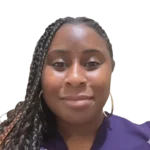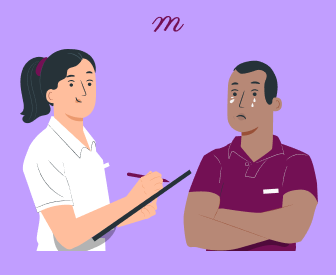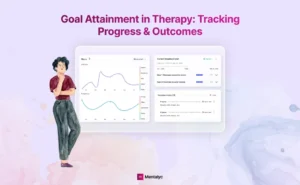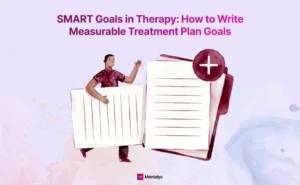Do you ever feel like you’re playing 20 Questions with your clients? Well, buckle up because you are about to learn about open-ended questions in counseling. These are the kinds of questions that can open up a whole world of insights and emotions. Whether you’re a pro therapist or a fresh-faced student, mastering the art of asking the right questions can transform your practice. So, let’s dive into how these powerful tools can help you forge strong connections, promote self-discovery, and elevate your counseling skills. Are you ready to become a master of asking thought-provoking questions? Let’s do this!
Defining Open-Ended and Close-Ended Questions in Counseling
Let’s discuss a fundamental aspect of our work: asking questions. You’re likely familiar with open-ended and close-ended questions, but let’s delve into the details.
Open-Ended Questions in Counseling: The Conversation Starters
Imagine you’re in a counseling session with a client and want to create a space for an open and meaningful conversation. This is where open-ended questions come into play: the heavy lifters of the counseling world. They’re like invitations to your client’s inner world, encouraging them to explore their thoughts and feelings.
For instance, instead of asking a closed-ended question like “Did you have a good week?” you could ask an open-ended question like “Tell me about your week.” Notice the difference? One encourages a simple yes or no response, while the other encourages a more extensive and meaningful conversation.
Brainstorm:
Can you think of a recent session in which an open-ended question led to a breakthrough moment? What was the question, and how did it impact the session?
Close-ended Questions in Counseling: The Fact Finders
Keep in mind that close-ended questions have their own value. They are helpful when you require specific information or want clarity on a certain point. Consider them as reliable tools in the counseling room.
Close-ended questions typically yield succinct answers. Examples like “Did you take your medication today?” or “How many hours did you sleep last night?” are ideal for obtaining precise data or when a simple yes or no response suffices.
Striking the Right Balance Between Open-Ended and Close-Ended Counseling Questions
Here’s the thing: your counseling sessions shouldn’t be an interrogation or a one-sided conversation. The key is to strike a good balance between open-ended and close-ended questions. You should use open-ended questions to delve deeper and close-ended ones to gather specific details. The ultimate goal is establishing a safe and comfortable environment for clients to explore their thoughts and emotions. So, next time you’re in a session, pay attention to the questions you’re asking. Are you inviting elaboration or just collecting facts? Your question choice can make all the difference in building that all-important therapeutic alliance.
Ask Yourself:
How do you currently balance open-ended and close-ended questions in your sessions? What challenges do you face in finding the right mix?
The Power of Open-Ended Questions in Counseling: How They Build Rapport and Understanding
Open-ended questions have a powerful impact on building rapport and gaining deeper insights from clients in therapy. They can resonate and open up new perspectives, making them invaluable tools in the therapeutic process.
Think About:
Have you ever noticed how some questions just click with your clients, opening up a new world of insights?
Unlocking the Conversation Floodgates
Consider this scenario: When you ask a client, “How are you feeling today?” they may open up and start pouring their heart out. This demonstrates the impact of using open-ended questions. By asking such questions, you can encourage your clients to delve deeper into their emotions and thoughts rather than receiving brief responses like “fine” or “okay.”
Analyze:
Can you recall when an open-ended question led to a significant breakthrough in your client’s understanding? What was the question, and how did it impact the session?
Building Trust, One Question at a Time
Asking open-ended questions demonstrates genuine care for your clients’ thoughts and feelings. It communicates that you are attentive and value their perspectives. This approach fosters trust rapidly, creating a non-judgmental space where clients feel comfortable expressing themselves openly.
Examine:
What are some specific open-ended questions you use to build trust with your clients? How do these questions help establish a strong therapeutic relationship?
Digging Deeper, Understanding Better
Using open-ended questions can lead to a deeper understanding of your clients’ experiences. These questions encourage self-reflection and enable clients to make connections within their own stories. For instance, asking, “How did that situation impact your relationships?” can prompt clients to explore connections they may not have considered before. It’s just like providing them with a flashlight to navigate the recesses of their minds.
Remember, the objective is to gather information and promote understanding and personal growth; therefore, incorporate more open-ended questions into your sessions. You might be surprised by the insights they reveal and the new perspectives they offer!
Reflect On:
Think of a session where you used an open-ended question to help a client make connections in their story. What was the question, and what insights did it lead to?
Formulating Effective Open-Ended Counseling Questions
Ready to up your question game? Let’s dive into crafting those killer open-ended questions that’ll have your clients opening up like never before!
The Art of the Ask
You know the drill—open-ended questions are your secret weapon for getting clients to spill the beans. But how do you cook up questions that pack a punch? Start by keeping things clear and straightforward. Ditch the jargon and ask, “What’s been on your mind lately?” It’s concise but allows clients to have conversations wherever necessary.
Consider:
What strategies have you found effective in crafting open-ended questions?
Tailor-Made Queries
Customizing your questions to suit the individual or situation regarding counseling is essential. For example, when working with a couple, ask, “How do you two handle disagreements?” When working with a teen client, you could ask, “What’s the toughest part about being in high school right now?” The goal is to ask relevant questions about their experiences and the world.
Evaluate:
How do you tailor your questions to fit individual clients?
Avoid the Pitfalls
Be mindful of using leading questions. Instead of asking, “Don’t you think your boss is being unfair?” consider asking, “How would you describe your relationship with your boss?” This way, you allow the other person to take the lead without influencing their response.
Practice Makes Perfect
Mastering the art of crafting great open-ended questions takes practice, just like any other skill. Try role-playing with a colleague or jotting down potential questions before your sessions to improve. It’s important to remember that it’s okay to make mistakes sometimes, as your clients will value your genuine effort to understand them.
By honing your skill in asking open-ended questions, you’ll create an environment where your clients feel heard and understood honestly. So, don’t hesitate to get curious and observe the conversations evolve!
Overcoming Common Challenges with Open-Ended Questions in Counseling
Open-ended questions can be powerful in counseling but can also present challenges. Let’s examine some common issues and practical solutions to help you navigate these challenges confidently.
Challenge 1: Clients Providing Short or Vague Responses
Solution: Encourage Elaboration
It’s common for clients, primarily those new to counseling, to provide brief or vague answers. When this happens, gently prompt them to elaborate. Encouraging clients to expand on their initial responses helps them delve deeper into their thoughts and emotions.
Example Prompt: “Can you tell me more about that?”
Follow-Up Question: “What thoughts or feelings come to mind when you think about that experience?”
Mull Over:
When a client gives a short response, what follow-up questions could you ask to encourage them to elaborate?
Challenge 2: Navigating Sensitive Topics
Solution: Approach with Care and Empathy
Open-ended questions can sometimes touch on sensitive areas. Approach these topics with empathy and care, ensuring clients feel safe and supported. Creating a safe space for clients to discuss sensitive issues fosters trust and openness.
Example Approach: “It seems like this is a difficult topic. Can you share more about how you’re feeling right now?”
Reassuring Statement: “It’s okay to take your time. We can explore this at your own pace.”
Contemplate:
How do you ensure your clients feel safe when discussing sensitive topics? What language or techniques do you use?
Challenge 3: Avoiding Leading Questions
Solution: Maintain Neutrality
Leading questions can unintentionally steer clients toward a particular response, hindering genuine exploration. Strive to keep your questions neutral.
Example Adjustment: Instead of asking, “Don’t you think that was unfair?” try, “How did you feel about that situation?”
Neutral Question: “What was your reaction to that event?”
Give Thought To:
Can you identify any leading questions you might have used recently? How could you rephrase them to be more neutral?
Challenge 4: Balancing Open-Ended and Close-Ended Questions
Solution: Use a Mix Strategically
Finding the right balance between open-ended and close-ended questions is essential for effective counseling. Use open-ended questions to explore and close-ended questions to clarify.
Example Balance: Start with, “Can you describe your week?” followed by, “Did you manage to meet your goals?”
Strategic Use: “What were the highlights of your week?” and then, “Were there any specific challenges?”
Ponder:
How do you balance open-ended and close-ended questions in your sessions? What changes could enhance this balance?
Challenge 5: Clients Struggling to Open Up
Solution: Build Rapport and Trust Gradually
Some clients may find it challenging to open up, especially in the initial sessions. Building rapport and trust is critical.
Example Icebreaker: “What brought you here today?” or “What do you hope to achieve in our sessions?”
Gradual Approach: “How do you feel about starting with some small steps?”
By addressing these common challenges with practical solutions, you can enhance your effectiveness in using open-ended questions in counseling. Remember, every client is unique, so be flexible and adaptive. Keep experimenting, stay curious, and refine your questioning techniques to create a supportive and insightful therapeutic environment.
Investigate:
What strategies do you use to build rapport with new clients?
How can you help your clients feel more comfortable opening up?
Strategies for Integrating Open-Ended Questions into Counseling Sessions
Start with a Warm-Up
Begin your session by asking gentle, open-ended questions to initiate the conversation. You could inquire about their week or what they’ve been thinking about lately. These simple opening questions can help your client feel more at ease and establish a comfortable atmosphere for the session.
Follow the Client’s Lead
It’s essential to actively listen to your client and look for opportunities to delve deeper. When they bring up something interesting, capitalize on that by asking open-ended questions to explore the topic further. For instance, if they feel stressed, you can ask, “Can you describe what that stress is like for you?” This approach demonstrates your attentiveness to their words and commitment to understanding their perspective.
Use the “Tell-Me-More” Technique
A simple prompt like “Tell me more about that” can be very effective when looking to delve deeper into a subject. It’s a flexible phrase that promotes additional details without being overly directive. You can also use alternatives such as “Could you elaborate on that?” or “What other thoughts do you have about this?”
Incorporate Reflective Questioning
Rephrasing their statements as questions can be effective when engaging with your client. For example, if your client feels overwhelmed, you can respond by saying, “It seems like you’re feeling overwhelmed. How does that manifest in your daily routine?” This approach demonstrates active listening and encourages them to explore their feelings further.
Balance with Close-Ended Questions
When gathering information, it’s essential to balance open-ended and closed-ended questions. Open-ended questions are perfect for delving into new areas, while closed-ended questions are necessary for confirming details and ensuring understanding. You can gather comprehensive and specific information by utilizing a mix of both types of questions.
When incorporating open-ended questions, remember there’s no need to stick to a rigid formula. The goal is to foster a seamless conversation flow in your sessions, empowering your clients to delve deeper into their thoughts and emotions. You’ll discover the most influential rhythm and approach for you and your clients with practice.
Think About:
Think about a recent session. How could you have incorporated more open-ended questions to encourage deeper exploration?
Conclusion: The Importance of Open-Ended Questions in Counseling
Remember the incredible impact of open-ended questions in counseling! Mastering this skill will foster deeper connections with your clients and help them gain valuable insights. It’s all about creating a safe space for exploration and growth, not bombarding them with endless questions. You’ll notice a significant difference in your sessions as you incorporate these techniques into your practice. Keep experimenting, stay curious, and don’t hesitate to get creative with your questions. Remember, practice makes perfect. The more you use open-ended questions, the more natural and effective they’ll become in your counseling toolkit. Your clients will be grateful, and you’ll find your work even more fulfilling.
If you found these insights helpful, why not put them into practice today? Reflect on the questions you use and start incorporating more open-ended questions into your sessions. Experiment, observe the outcomes, and remember to share your experiences with fellow practitioners. Let’s continue to grow and learn together in our journey to provide the best support for our clients. Join the Mentalyc community today and sign up for a free trial of our AI progress note writer.
FAQ: Common Open-Ended Questions in Counseling
Navigating the world of open-ended questions in counseling can be tricky. Here are some frequently asked questions to help you master this essential skill:
What makes an excellent open-ended question?
You’ll want to aim for clarity, relevance, and neutrality. A good open-ended question invites your client to explore their thoughts and feelings without leading them in a specific direction. For example, “How did that experience affect you?” is much better than “Don’t you think that experience was traumatic?”
How many open-ended questions should I ask in a session?
There’s no magic number, but balance is critical. You don’t want to overwhelm your client with a barrage of questions, nor do you want to leave them hanging. Mix it with some close-ended questions for specific information, and use silence effectively to give your client space to reflect.
What if my client gives short answers to open-ended questions?
Don’t panic! Sometimes, clients need time to warm up or may not be used to this type of questioning. Try rephrasing your question or gently encouraging them to elaborate. You might say, “Can you tell me more about that?” or “What thoughts come to mind when considering that situation?”
Are there any topics I should avoid with open-ended questions?
While open-ended questions are generally great for exploring, be mindful of your client’s emotional state and the therapeutic relationship. Avoid questions that might be too elusive early on, or that could trigger trauma responses without proper preparation. Always prioritize your client’s comfort and safety.
Resources:
Appinio Research. (2023, May 9). How to Ask Open-Ended Questions? Examples, Advantages. https://www.appinio.com/en/blog/market-research/open-ended-questions
Counselling Tutor. (2013, January 24). Questions in Counselling. https://counsellingtutor.com/basic-counselling-skills/clarifying-and-questions/
Holmes, L. (2003, November 24). Why Are Therapist Questions Open-Ended? Verywell Mind. https://www.verywellmind.com/open-ended-questions-2330693
The Homeless Hub. (2007). Motivational Interviewing: Open Questions, Affirmation, Reflective Listening, and Summary Reflections (OARS). https://www.homelesshub.ca/resource/motivational-interviewing-open-questions-affirmation-reflective-listening-and-summary
Miracle Foundation. (2021). Basic Counseling Skills III – Open and Closed Questions. https://www.miraclefoundation.org/wp-content/uploads/2021/06/Basic-Counseling-Skills-III-Open-and-Closed-Questions.pdf
Souders, B. (2020, February 7). Classic Therapy Questions Therapists Tend to Ask. PositivePsychology.com. https://positivepsychology.com/common-therapy-questions/
Sutton, J. (2022, August 11). Motivation in Counseling: 9 Steps to Engage Your Clients. PositivePsychology.com. https://positivepsychology.com/motivation-counseling/
Why other mental health professionals love Mentalyc

“For anyone hesitant: this is a lifesaver. It will change your life, and you have more time to be present with your patients.”
Licensed Clinical Social Worker

“It immediately changed my quality of life, personally and professionally.”
Owner/Independently Licensed Marriage & Family Therapist (LMFT)

“Do yourself a favor, make your life easier. I found Mentalyc to be one of the best tools that I’ve ever used.”
Licensed Marriage and Family Therapist

“If I were recommending this software to a colleague, I would tell them that it is the best thing that they could do for their practice.”
Licensed Professional Counselor







